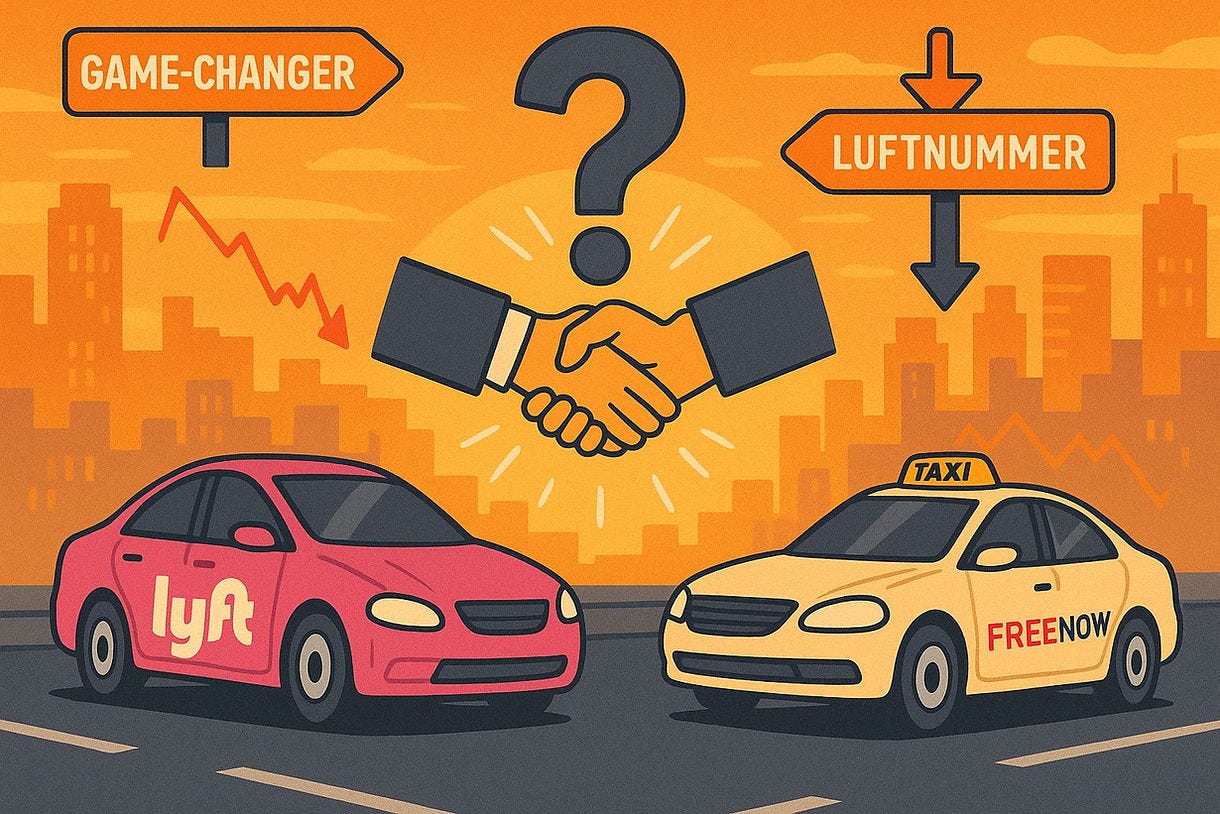Lyft Stock: Freenow Acquisition - Game Changer Or Flash In The Pan?
Lyft has announced the acquisition of European mobility platform Freenow, a move that will expand its operations from only two markets to eleven.
For several months, I have been investing in the mobility platform Lyft alongside Uber. Check out my Lyft investment case.
Since its founding in 2012, LYFT 0.00%↑ has limited its operations to the United States and Canada and has not invested in international expansion outside of North America. That is now changing, as Lyft has announced the acquisition of European mobility platform Freenow for €175 million (approximately $197 million) in cash.
What is Freenow?
Freenow operates in nine European countries (Germany, UK, Ireland, France, Spain, Italy, Poland, Greece, and Austria) and provides mobility services in over 150 cities with a focus on taxi hailing. Lyft's acquisition of the Freenow platform from its previous owners, the German car makers BMW and Mercedes-Benz, is expected to close in the second half of 2025.
The acquisition nearly doubles Lyft's addressable market to over 300 billion potential rides per year. However, it only adds about $1 billion to Lyft's annual gross bookings, representing about 5% inorganic growth.
As Freenow is a private company and has not yet disclosed exact revenue figures, only a rough estimate of revenue can be made based on available information. Based on typical commission rates of 15-25% in the European mobility market, Freenow's revenue can be estimated at approximately €150-250 million. Growth has recently been 13%, and Freenow says it reached profitability in 2024 after many years of losses.
So the purchase price of €175 million for Freenow should be roughly equivalent to the company's one time sales. This does not seem too expensive for such a strategic acquisition. For comparison (see here): Lyft's EV/sales ratio is less than 0.7 at the current share price of $11, while market leader Uber is valued much higher with an EV/sales ratio of 3.5.
Lyft CEO David Risher emphasized that entering the European market is a significant milestone for Lyft's future. Freenow is the leading player in the European taxi industry. It has extensive expertise, established relationships with local regulators and taxi companies, and advanced fleet management technologies. Lyft, in turn, can complement Freenow's existing business model with its sophisticated marketplace technology and user-centric features.
I think it's a very smart move for Lyft to enter the highly regulated European market by acquiring an established international player, rather than trying to tackle individual markets organically one by one.
In 2024, approximately 90% of Freenow's gross bookings were in the taxi segment. The market for ride hailing services in Europe lags significantly behind the North American market. Approximately half of all taxi bookings are still made offline. Freenow is the undisputed market leader in cities such as Berlin, London, Madrid, Hamburg and Athens.
What Are Lyft's Plans For Freenow?
Nothing will change for Freenow customers in the short term. Lyft intends to continue to use the well-established Freenow brand in Europe and support both apps, at least for the time being. New features for drivers and passengers that have proven successful with Lyft in North America will be introduced to Freenow. In the medium to long term, however, I think a rebranding is likely and the Freenow brand will disappear.
In any case, the two apps will be integrated. This means that users in North America and Europe will have the flexibility to switch between the platforms. European Freenow customers visiting North America will be able to use Lyft ride-hailing services there, and American tourists or business travelers will be able to use Freenow services in Europe through their Lyft app.
What Does The Freenow Acquisition Mean For The Lyft stock?
In the short term, Freenow will have little impact on Lyft's financials. Its share of revenue will likely be in the mid-single digits starting in 2026. I do not expect much change in earnings from previous guidance. Lyft has already earned the purchase price for Freenow in a single good quarter of cash flow. So the risk of this acquisition is limited for Lyft.
In the long run, this acquisition could be a great investment for Lyft. The European mobility market is several years behind North America, but is likely to benefit from more digitization and (hopefully) less regulation in the coming years and should grow faster than the U.S. market due to catch-up effects.
After the Freenow acquisition Lyft will be present in eleven countries, not just two. Analysts have repeatedly cited the lack of internationalization as a reason for the significant valuation discount to market leader Uber. This argument against Lyft stock is no longer valid.
Its international presence will also make Lyft more attractive for new partnerships with autonomous vehicle technology providers in the future. This, in return, could breathe new life into Lyft stock. Until now, Lyft has been seen (unfairly?) as a loser in the race to the new world of autonomous driving, and as a result has been strongly undervalued with a current cashflow multiple of only 5.
If you would like to follow the development of Lyft and Uber with me in the future, you can subscribe to my 100% free Substack here.
*Disclaimer: The author and/or related persons or companies own shares in Uber and Lyft. This article is an expression of opinion and does not constitute investment advice.





